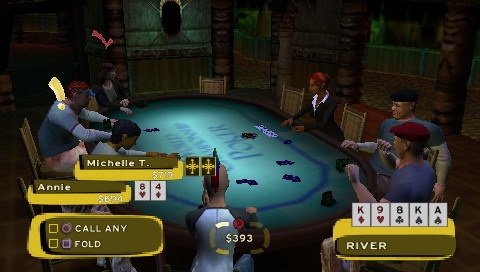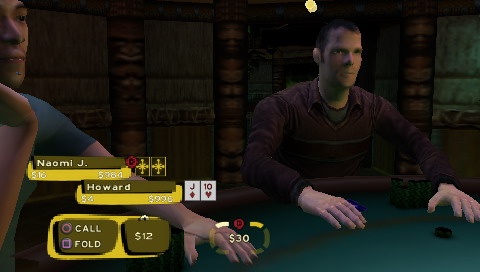Last year's World Championship Poker: Featuring Howard Lederer was, for its time, the best game of poker available for a game console. In that time, both Myelin Media's Stacked and even Activision's World Series of Poker franchises have lapped that game in both artificial intelligence and presentation, respectively. Unfortunately, with its latest installment, World Championship Poker: Featuring Howard Lederer - All In, Crave and developer Point of View have failed to catch up with the times. This is essentially last year's game, marginally improved. A few tweaks have been made to make the players at the table smarter, but they're just as prone to ill-advised plays as before, and some of the poker variations available suffer from bizarre hand repetition, which is a new and baffling problem.

The game's progression follows the same pattern as last year. In the career mode, you begin by creating a character from a wacky set of available appearance options and then find yourself on a map, complete with several marked casinos and other seedy gambling locations where you can jump into a game. You start with $1,000 and a dream, and each week you get to choose from several games to play in. The one nice feature All In does offer is a wide variety of poker variations, from Texas hold 'em to Omaha, five-card draw, seven-card stud, razz, and HORSE. As you progress, you can earn skill points to give you specific advantages while playing in a game, as well as upgrade your house, which is a hub area for you to check out from time to time.
The career mode is novel enough in concept, but it's sunk by the same problems last year's career mode suffered from. Specifically, there are way too many limit games that can literally take hours to get through. You do get to choose from multiple games each week, but there are weeks where there are next to no games available from the traditional hold 'em or Omaha ilk. There isn't much that's more infuriating and dull than playing a hi-low limit Omaha game against six computer opponents. The game does now include a turbo mode that skips through a lot of the chaff, but this mode moves so fast that it's nigh-on impossible to keep proper track of the action on the table.
A new problem is that some of the games on the roster are straight-up broken. How, you ask, do you break poker? Well, for one, don't randomly generate hands; instead, put them on some kind of weird algorithm that makes the same hands come up over and over again. This isn't so much an issue with games like hold 'em and Omaha, but while playing five-card draw, we ran into the same starting hands and the exact same draws time and time again. On no less than four occasions in one game were we dealt a 10, an 8, a 2, a 3, and a 5. Each time we dropped the 2, 3, and 5 and were dealt the exact same queen, jack, and nine to make a straight. Less often did we notice this while playing seven-card stud, but we did run into at least a few hands that felt exceedingly familiar.
Apart from these weird bouts of hand repetition, the AI in All In isn't quite up to snuff. The one improvement the developers seem to have made this year is that computer players will occasionally try to trap you. They'll check raise to try and lure you in with a big hand from time to time and can occasionally fool you while doing so. The trouble is that even with these occasional, unpredictable traps, the AI is still frequently crazy with its calls and raises. AI players will check through a made straight on the river, even if there's no feasible hand that can beat them on the table. Likewise, other players will bet like crazy on small pairs, even when there are pairs and possible straight and flush draws on the board. On the other side of the coin, limit games are completely predictable. One player will always raise before the flop, and nearly every time, at least one player will stick with it through to the very last card, regardless of hand strength. There are a few distinct personality types you might be able to discern while playing, but all of them make the same bizarre calls and raises, regardless of personality.
The goofy tell system from last year's game is back again this year, and it's not any better than it was before. If you play a strong hand coyly, or try to bluff with nothing, a quick, timing-based minigame will pop up, and depending on where you hit, you'll either blow it and show a tell, do the opposite and act your way through the hand, or simply sit stone faced. The system is still completely exaggerated and a bit weird. The only time it comes into play with computer players is when you've built up one of your statistics high enough to more carefully notice other players' tells. But considering how ultimately predictable and off-kilter the plays the computer players make are anyway, it's not like these tells do much for your game.
Like last year's game, All In includes online play on both the PlayStation 2 and PSP. Hosts can create games from any of the available poker variations, as well as set buy-ins based on their offline bankroll. It's a decent online setup, except that nobody is playing online. We couldn't find but a scant handful of games for either version of the game, and none of the games we did find ever got going, simply because no other players beyond us and the host of the game ever showed up.

Though few poker games out there provide much in the way of graphical or audio presentation, All In, by far, does the least. The graphics look ancient on both platforms, with extremely blocky character models, stilted animations, and lousy-looking backgrounds and tables. While there are a few pro players in the game, they haven't been given decent treatment. Their faces don't animate, and you get no real banter to speak of. The rest of the time you're playing against ridiculous characters wearing bunny ears, gas masks, and rainbow Mohawks. These players do tend to throw some one-liners at you, but they're all terrible. Goofball announcers periodically throw in painfully dumb and extremely repetitive quips from time to time, and there's an annoyingly surfer soundtrack that sounds like it was lifted out of a Frankie Avalon movie. As far as any differences between the PS2 and PSP versions of the game are concerned, beyond the predictably scaled-back visuals on the PSP, as well as that version's longer initial load times, the two are comparable to one another.
No single poker game out there has created the perfect storm of play, presentation, and variety, but few of the recent entries in the genre fail at all of the above at the same level that All In does. Failing to deliver proper hand randomization is simply inexcusable, and once you throw on the ugly graphics, painful audio, and lackluster AI, you get a game that no poker player will want to waste their time with, even at a budget price.